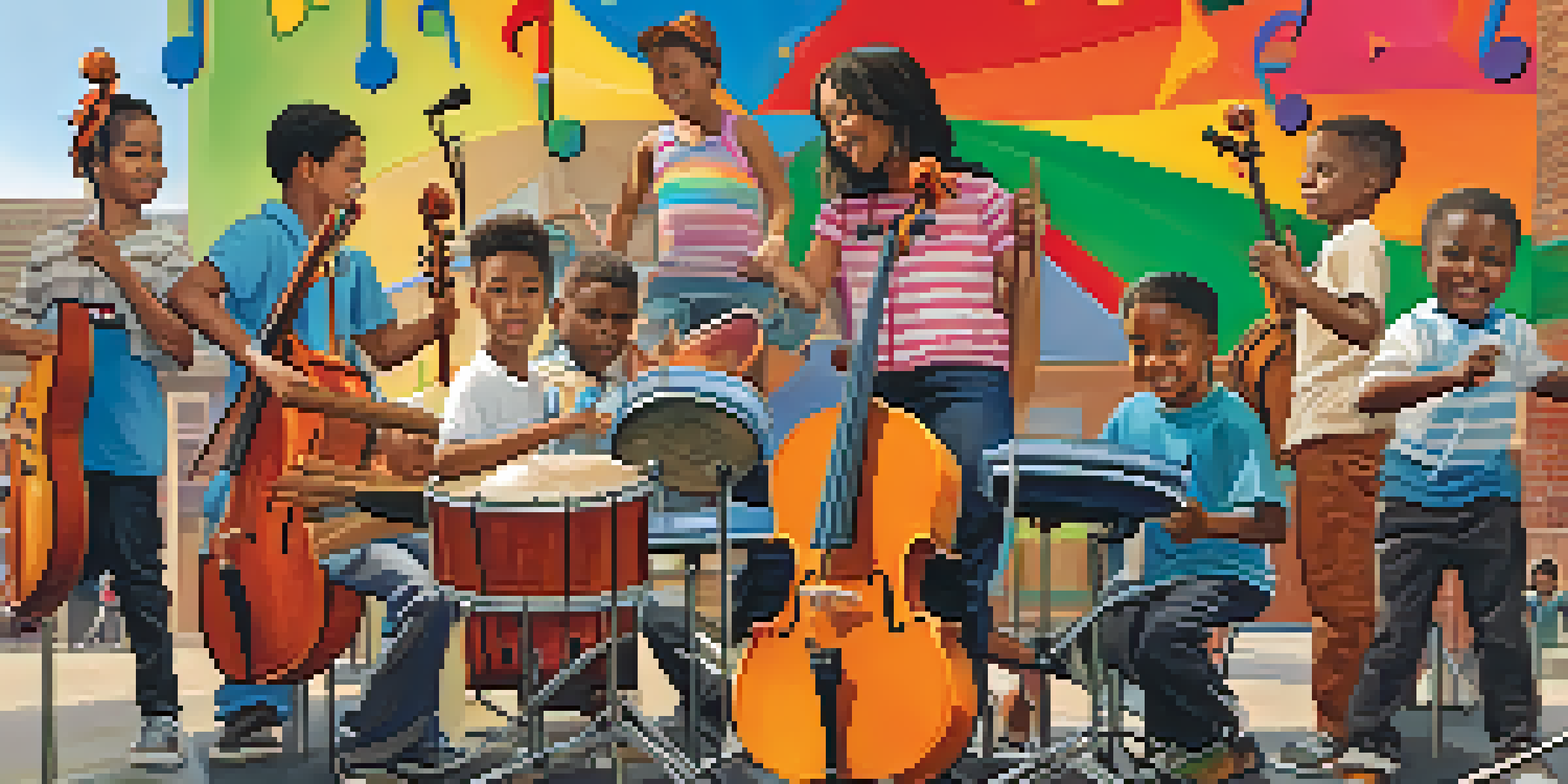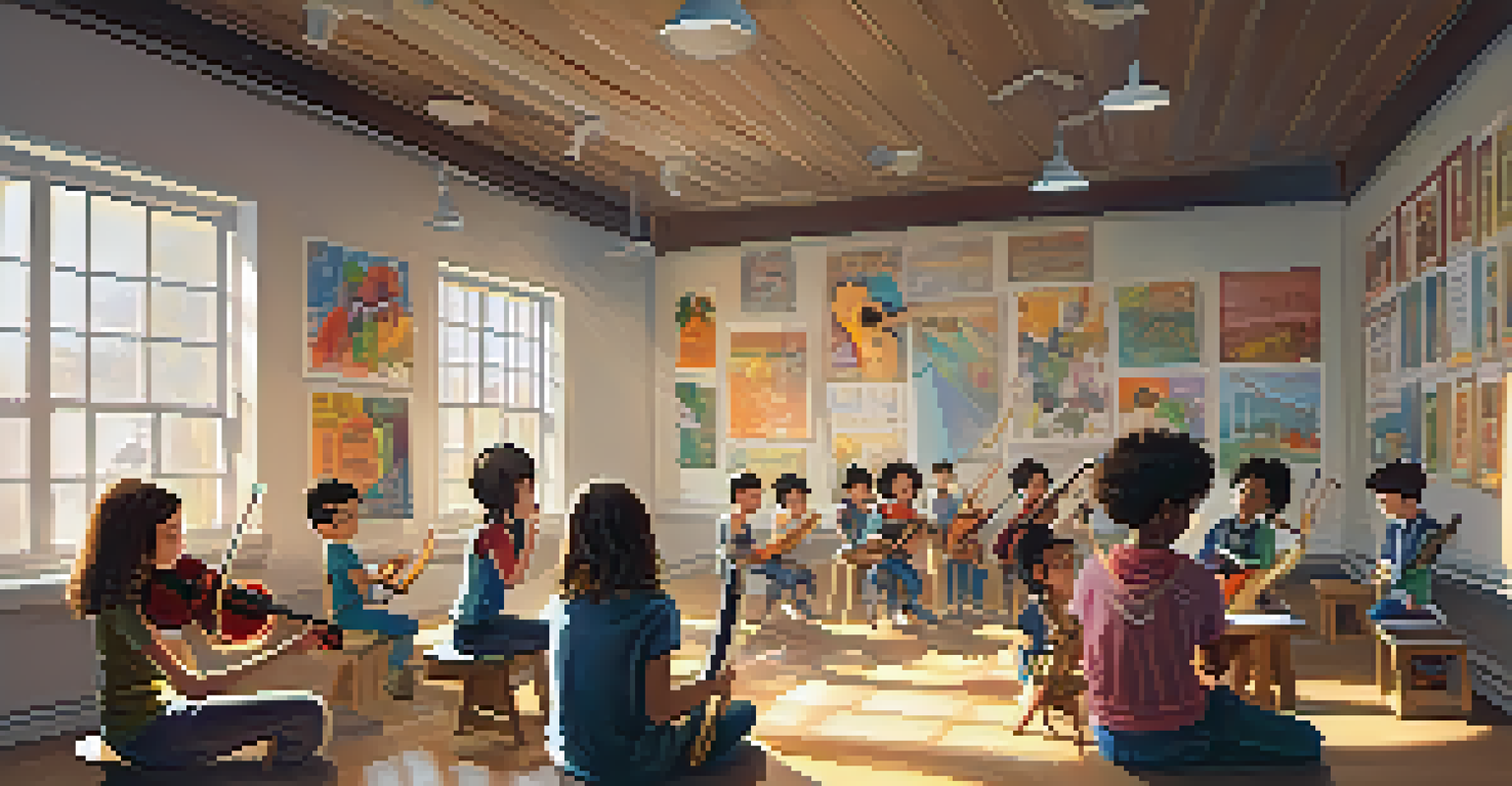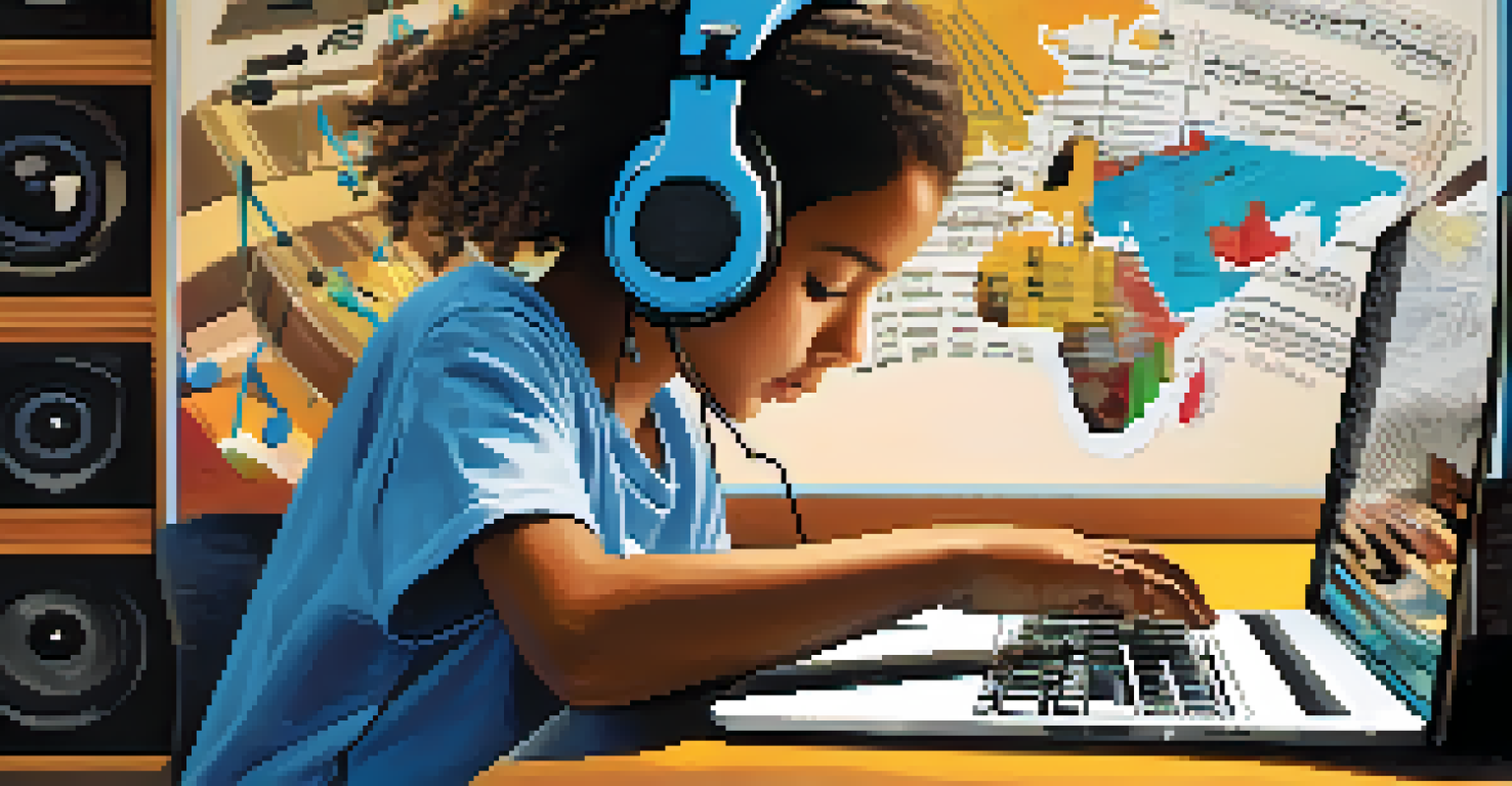Exploring Chicago's Diverse Music Education Programs for Youth

An Overview of Chicago's Music Scene for Youth
Chicago's music scene is as diverse as its population, offering a rich tapestry of genres that appeal to young musicians. From jazz to hip-hop, the city's vibrant culture nurtures creativity and expression. This environment fosters a love for music that can inspire youth to explore their talents and develop their skills.
Music can change the world because it can change people.
Many young people are drawn to the city’s historical significance in shaping music genres, making it an ideal place for music education. Schools and community organizations work hand-in-hand to provide programs that cater to various interests, ensuring that every child can find their niche. This blend of history and opportunity creates a supportive backdrop for budding artists.
Moreover, the presence of renowned venues and festivals serves as motivation for young musicians. Events like the Chicago Blues Festival and Lollapalooza not only showcase talent but also provide aspiring artists with a glimpse of what success looks like in the music industry.
Community Programs Making a Difference
Community-based music programs play a vital role in providing accessible education to Chicago's youth. Organizations like the Chicago Music Project and the People’s Music School offer free or low-cost lessons, ensuring that financial barriers don’t prevent kids from pursuing their passion. These programs often emphasize inclusivity and diversity, welcoming students from various backgrounds.

In these community settings, young musicians not only learn instruments but also gain invaluable life skills such as teamwork and discipline. Activities are often designed to build confidence, allowing students to perform in front of audiences and share their passion. This communal approach fosters a sense of belonging while promoting artistic growth.
Diverse Music Scene Inspires Youth
Chicago's rich musical landscape motivates young musicians to explore their talents across various genres.
Additionally, many of these programs collaborate with local schools, enhancing the educational experience for students. By integrating music education into the school curriculum, these initiatives ensure that children receive well-rounded development, which is crucial for their personal and academic success.
The Role of Schools in Music Education
Schools across Chicago are stepping up to enrich their music education offerings, recognizing the importance of music in a child's development. Many institutions have implemented robust music programs that include band, choir, and orchestral options. This diversity allows students to explore different instruments and genres, nurturing a broad appreciation for music.
The beauty of music is that it connects people, and this connection can lead to powerful change.
In addition to standard music classes, some schools offer extracurricular ensembles and competitions, giving students the opportunity to showcase their talent. These programs often encourage collaboration among peers, which can lead to lifelong friendships and a deeper love for music. The excitement of performing at events can be a pivotal moment in a young musician's journey.
Moreover, partnerships between schools and local musicians bring real-world experience into the classroom. Guest artists often conduct workshops, providing students with insights into the music industry and inspiring them to pursue their dreams.
Non-Profit Organizations Promoting Music Education
Non-profit organizations dedicated to music education in Chicago are crucial for empowering youth musicians. Programs like Harmony, Hope & Healing focus on using music as a healing tool, offering classes to underserved communities. By addressing social issues through music, these organizations create a positive impact on both individual lives and the community as a whole.
These non-profits often provide mentorship opportunities, allowing students to connect with experienced musicians who can guide their development. This relationship can be transformative, helping young artists navigate their paths in the competitive music landscape. With the right guidance, many students find the support they need to flourish.
Community Programs Enhance Education
Local organizations offer accessible music education, fostering inclusivity and personal growth for youth.
Furthermore, these organizations frequently organize performances and showcases, giving students the chance to present their work to the public. These events not only build confidence but also help young musicians gain exposure, potentially opening doors for future opportunities in the music industry.
The Impact of Technology on Music Education
In today's digital age, technology has revolutionized music education for youth in Chicago. Online platforms and apps make learning accessible to a broader audience, enabling students to explore music theory, composition, and performance from the comfort of their homes. This flexibility allows for personalized learning experiences tailored to individual interests and skill levels.
Moreover, virtual classes and workshops have become increasingly popular, especially following the pandemic. This shift not only keeps music education alive during challenging times but also connects students with a global community of musicians. Learning from artists around the world enhances their understanding of different styles and techniques.
Additionally, technology enables collaboration among young musicians, regardless of location. Tools like digital audio workstations and social media platforms empower them to create and share music, fostering a sense of camaraderie and innovation. This technological integration opens up new avenues for creativity and expression, shaping the future of music education.
The Importance of Diversity in Music Programs
Diversity in music education programs is essential for fostering a well-rounded musical experience. Chicago's rich cultural landscape is reflected in its music education, where various genres and traditions are celebrated. Programs that embrace diversity allow youth to explore different musical styles, enriching their understanding and appreciation of music as a whole.
By encouraging participation from diverse backgrounds, these programs help break down cultural barriers and promote inclusivity. Students learn from one another, gaining new perspectives and insights that can enhance their musical journey. This collaborative environment nurtures empathy and understanding, which are invaluable life skills.
Technology Transforms Music Learning
Digital tools and online resources have revolutionized music education, making it more flexible and collaborative.
Moreover, exposure to a variety of musical influences can inspire creativity and innovation among young musicians. When students are encouraged to experiment with different genres, they often discover unique sounds and styles that reflect their individuality. This creative freedom is vital for developing their artistic voice and confidence.
Future Outlook for Music Education in Chicago
The future of music education for youth in Chicago looks promising, with ongoing efforts to expand and enhance programs. As communities recognize the value of music education, more resources are being allocated to support these initiatives. This investment will ensure that future generations of young musicians have access to quality education and opportunities.
Collaborations between schools, non-profits, and local artists are likely to increase, fostering a more interconnected music community. These partnerships can lead to innovative programming that meets the evolving needs of students, making music education more relevant and impactful. As the landscape continues to change, adaptability will be key.

Ultimately, the commitment to nurturing young talent will shape the future of Chicago's music scene. By providing diverse, accessible, and inclusive music education, the city is investing in the next wave of artists who will carry forward its rich musical legacy.